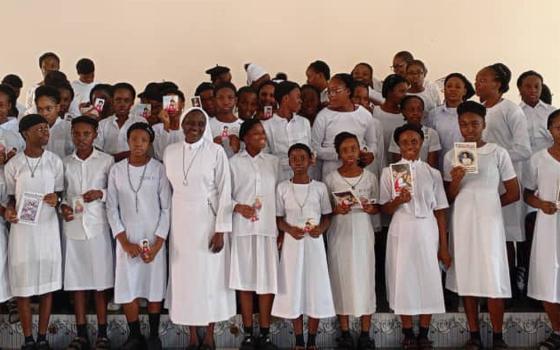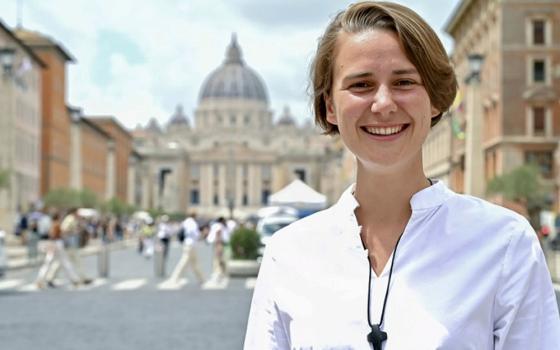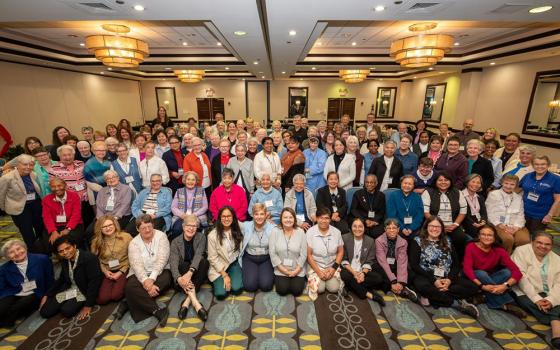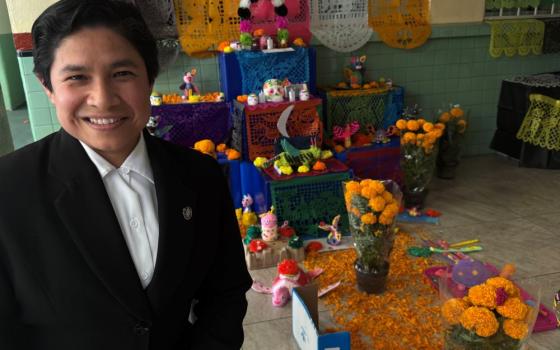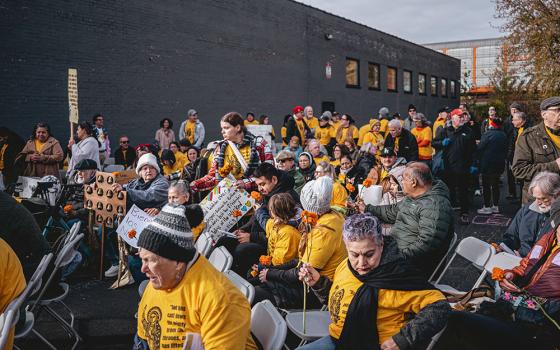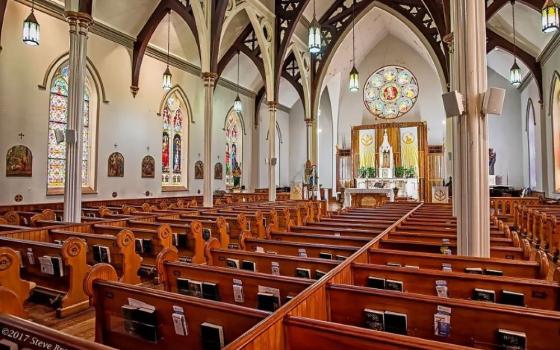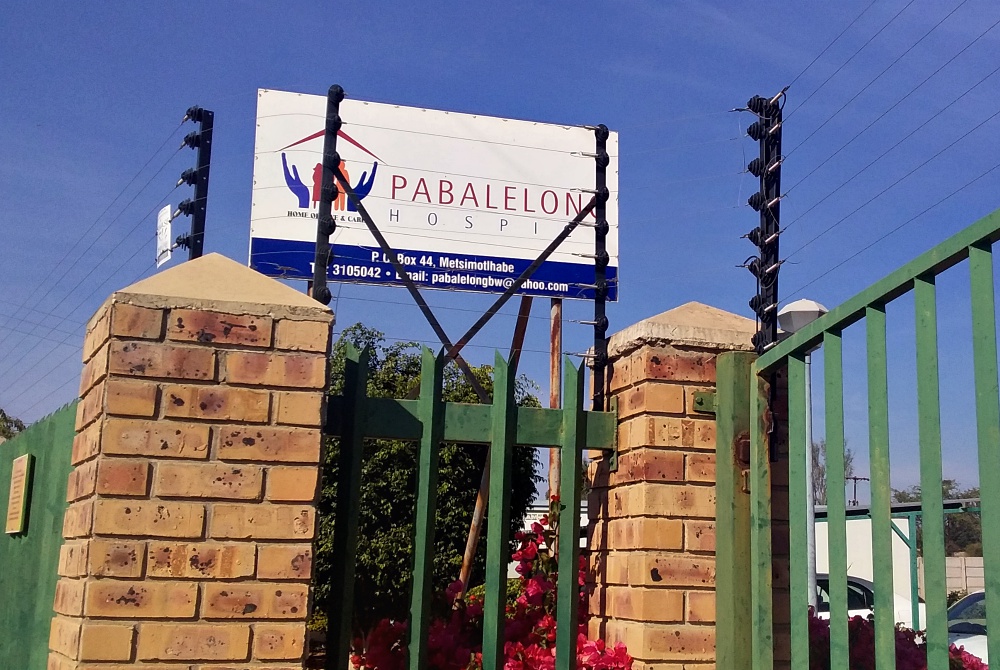
The Sisters of Charity of Nazareth who run Pabalelong Hospice in the village of Metsimotlhabe, Botswana, were not only tasked with caring for hospice patients but also ensuring that staff members were healthy and protected during the COVID-19 pandemic. (Rumbi Chakamba)
The deaths of five nuns in June due to COVID-19 at the Missionary Sisters of the Precious Blood convent in Mthatha, a town in South Africa's Eastern Cape province, have left sisters across the continent worried about how to carry out their ministries amid the pandemic.
The deaths of Srs. Celine Nxopo, Maria Wardhor, Martha Dlamini, Beautrice Khofu and Ambrose Shabalala began with the infection of a sister who worked as a nurse at Life St. Mary's Private Hospital in Mthatha.
"The nun who worked as a nurse was the prime source of the virus," said Precious Blood Missionary Sr. Nokwanda Bam, the head of the motherhouse who also tested positive for COVID-19. "She was quarantined by authorities and later, other members of the community were also discovered to be infected, resulting in five of them, all of them elderly, succumbing to the virus. More sisters have since been infected, young and old."
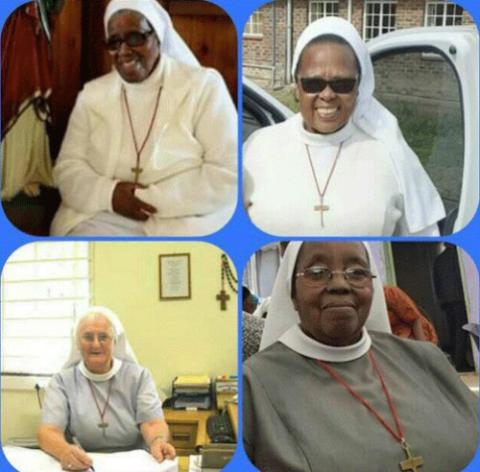
Five Missionary Sisters of the Precious Blood succumbed to COVID-19 in South Africa's Mthatha Diocese. Four of the five are, clockwise from upper left, Srs. Beautrice Khofu, Celine Nxopo, Martha Dlamini and Maria Wardhor. (Provided photo)
Bam said the convent, which also serves as a home for elderly sisters, has since been turned into a COVID-19 quarantine facility. More than 40 nuns based at the convent were tested and 21 members were found positive, but there have been no more deaths, she said.
"It's shocking and I have never seen such a thing in my life," she said, overcome with emotion. "The virus attacked and killed nuns who were doing missionary work. We are all devastated and deeply saddened by the deaths of our colleagues. We appeal for prayers."
Thousands of the more than 70,000 Catholic women religious in Africa are on the front line of facing an infectious disease caused by a newly discovered coronavirus and are at the highest risk of contracting the illness and cross-infecting others, including their own congregation members.
A majority of religious sisters are working in hospitals as nurses, doctors or other hospital staff to serve patients with COVID-19. Others run schools to educate children, projects to serve individuals living in poverty, and homes to care for the elderly.
Sisters have also been active in slums and poor villages across the continent to disseminate information about the virus. Their messages, some through leaflets, have been focused on hygiene and infection prevention, including social distancing, hand-washing using soap, and wearing masks.
The nature of sisters' work puts them at an increased risk of catching any communicable disease, including COVID-19, which has resulted in almost 30,000 deaths on the continent. As of Sept. 2, there were 1.25 million confirmed infections and 1 million recoveries, according to the Africa Centres for Disease Control and Prevention.
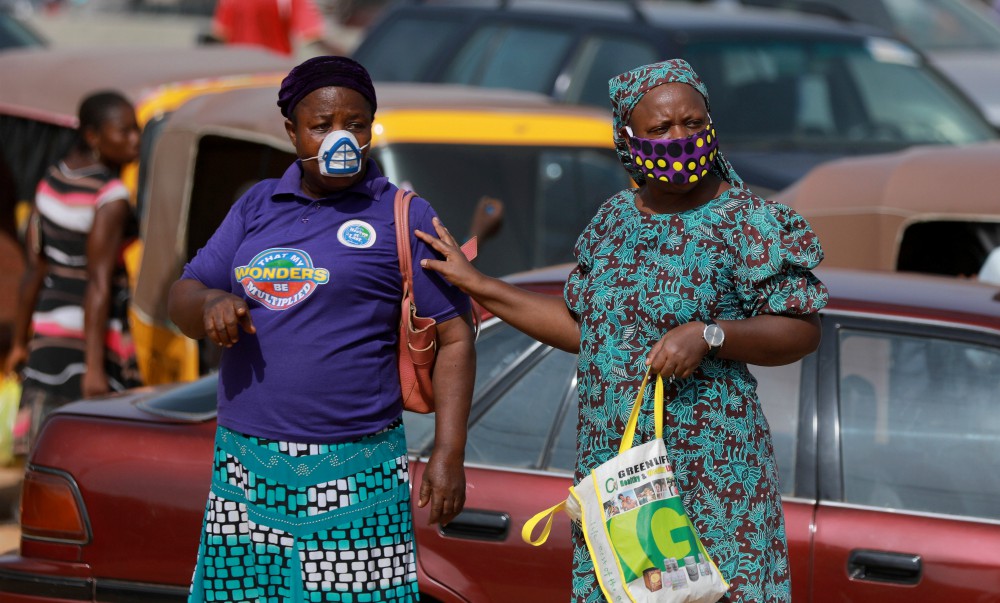
Women in Abuja, Nigeria, wear face masks May 2 during the coronavirus pandemic. Catholic sisters have also been active across Africa to disseminate information on hygiene and infection prevention. (CNS/Reuters/Afolabi Sotunde)
Tanzanians are still mourning the death of Sr. Anastasia Cristian Malisa, who died of COVID-19 in April while serving in Italy as a caregiver at the Casa di Riposo Santa Lucia of Rieti nursing home. The Tanzanian-born nun of the Franciscan Order of St. Clare (the Poor Clares) went to Italy at the age of 34. She was from Tanzania's Moshi District, which lies on the lower slopes of Mount Kilimanjaro.
"She died at the age of 60. She was a sister who came from Africa, simple, kind, fully fulfilled in her vocation as a religious sister and dedicated to the service of the little ones and our dear elderly," her associate Poor Clares described Malisa in a Vatican News report. "May the Lord, in His goodness, welcome her into his Kingdom of joy, reserved for his chosen ones."
In March, at the peak of the COVID-19 outbreak in Italy, senior citizens at the home where Malisa worked contracted the illness. Together with the staff at the nursing home, she was tested for the virus and the results came out positive.
She was admitted to the hospital for treatment and on March 29 she was transferred to the intensive care unit. "It was to be a month-long, excruciating fight for her life," Vatican News reported, and she died on April 25.
Back in Tanzania, some residents and religious sisters who knew Malisa expressed their affection and gratitude.
"We pray for all the religious sisters working on the front line in this fight against COVID-19. May the Lord give them good health and safety as they work to heal and serve us. We shall eternally remember Sister Anastasia as a hero. She was loving and caring. May her soul, through the mercy of God, rest in peace," said Sr. Mary Mshomi of the Poor Clares in Mwanza, Tanzania.
Continuing on the front lines
Despite some losing their lives, sisters are still braving the risk of contracting the disease so they can reach out to vulnerable people and also deliver critical medical services.
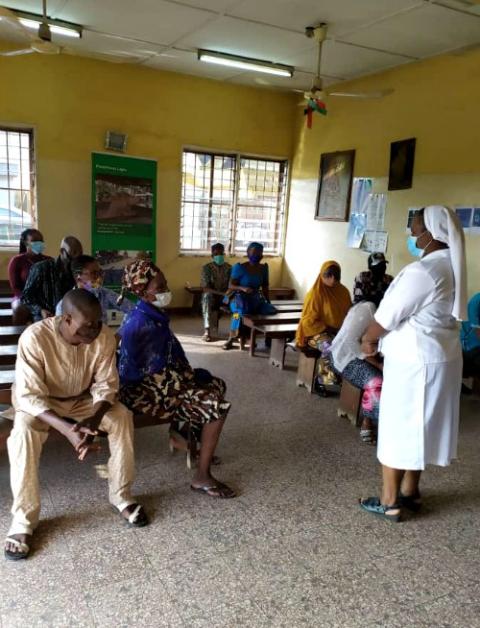
Notre Dame de Namur Sr. Prisca Igbozulike holds a COVID-19 awareness workshop for her patients at St. Catherine of Siena Medical Centre in Lagos, Nigeria. (Patrick Egwu)
In Lagos, the most populous city in Nigeria and the African continent, Sr. Prisca Igbozulike of the Sisters of Notre Dame de Namur and four other sisters of the community work at St. Catherine of Siena Medical Centre — a hospital run by the Lagos Archdiocese.
Igbozulike said that the battle against the virus has parallels to participating in a war. Armed with masks, gowns, gloves and goggles for protection, sisters are working round the clock to defeat the virus while risking their own lives.
"The situation we find ourselves in at the moment has not been easy, but we have to take care of the sick," said Igbozulike, who serves as the administrator of the hospital.
Nigeria — Africa's most populous country with a population of more than 200 million — has the highest number of coronavirus cases in the West African region. There are about 54,000 cases as of Sept. 2, according to the Nigeria Centre for Disease Control. More than 1,000 people have died from the coronavirus in the country.
Igbozulike said that, each day at the community where the sisters live, they pray and make petitions for their vocations. When the sisters arrive at the hospital at 8 a.m., they sing praises and say their prayers before getting to work, she explained.
"We rely on God's help for everything we do here by asking him to take control of our activities," she said.
Sr. Joycelyn Ezeugo of the Daughters of Mary Mother of Mercy is one of the doctors on the front line responding to the pandemic. She and a few other doctors were trained by Nigeria's Ministry of Health on handling COVID-19 cases. With the knowledge she acquired during the training, she is now an advocate and facilitator for other front-line health workers on how to respond to cases.
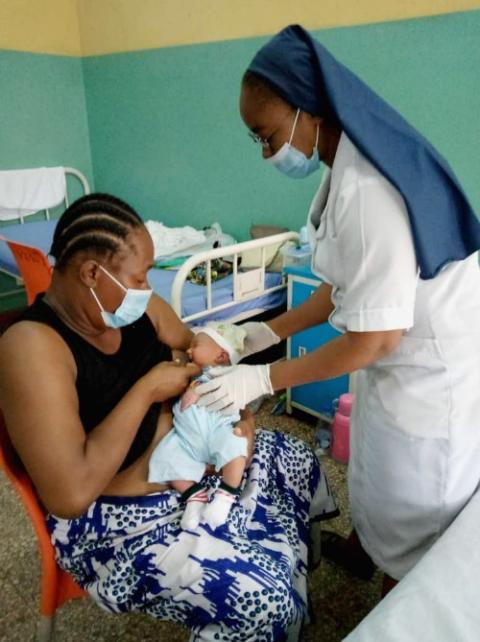
Notre Dame de Namur Sr. Agnes Enyi checks up on a nursing mother and her baby at St. Catherine of Siena Medical Centre in Lagos, Nigeria. (Patrick Egwu)
At the beginning of June, more than 800 Nigerian health workers had contracted COVID-19 since the outbreak started. At the National Hospital Abuja, where Ezeugo works, two doctors in May tested positive for the virus.
"I have fears and often go for testing, but they always come back negative," Ezeugo said. "I still have the feeling that I may have contracted it but recovered without knowing."
Lacking the basics
There are some challenges facing the work of the sisters amid the pandemic. Igbozulike said they lack basic protective equipment to work at the hospitals, making them more vulnerable to the virus.
"We protect ourselves in the little way we can," she said. "We don't have the money to buy protective equipment because they are expensive. If you buy them, you will not have the money to pay salaries, maintain the hospital or buy drug supplies."
South Sudan, which already has a struggling health care system, has so far reported 2,532 confirmed COVID-19 cases, 47 deaths and 1,290 recoveries as of Sept. 2, according to the Worldometer — a website that provides counters and real-time statistics for diverse topics.
The country is battling the twin threat of the virus and an uptick in violence that has left thousands of civilians dead. However, Sr. Orla Treacy of the Institute of the Blessed Virgin Mary, known as the Loreto Sisters, is fighting to ensure her patients avoid contracting the disease.
Treacy and other nuns who run Mary Ward Primary Health Care Centre have rolled out mass production of face masks and improvised personal safety equipment for themselves to boost the fight against coronavirus in the East African nation.
The Irish nun, who is creating awareness about the COVID-19 pandemic through local radio in Rumbek, a town in central South Sudan, is also encouraging locals to wash their hands with soap frequently, wear masks, and avoid touching their eyes, mouth and nose.
Advertisement
"One of the challenges the team has got, when going out to speak about coronavirus, is the challenge of culture," she told ACI Africa during the interview in May. "Our local community struggles to adapt to new practices. Shaking hands in the culture is a sign of acknowledging the other person; when you refuse to shake hands there is a belief that you are ignoring the dignity of the person."
In Botswana, a landlocked country in Southern Africa, authorities declared a strict lockdown in the capital Gaborone on July 31 for two weeks, closing schools and restricting movements, after confirmed local COVID-19 transmissions doubled that week.
The country with a population of 2.3 million people has recorded 1,724 coronavirus cases with six deaths since the epidemic began, according to Worldometer on Sept. 2.
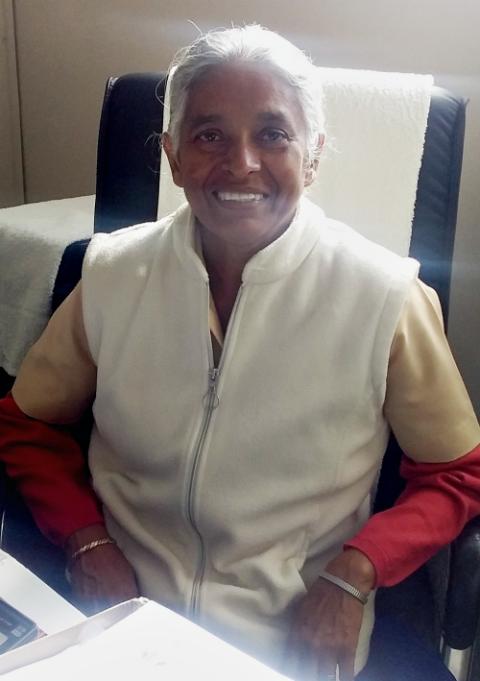
Sr. Sunila Erumangalathu is administrator of the Pabalelong Hospice in Metsimotlhabe, a town located in Botswana a little northwest of Gaborone, the country's capital town. (Rumbi Chakamba)
When Botswana recorded its first three cases of COVID-19 in March, Sr. Sunila Erumangalathu of the Sisters of Charity of Nazareth knew that she had to act quickly to adapt to the pandemic.
As the administrator of Pabalelong Hospice in the village of Metsimotlhabe, she was not only tasked with taking care of her patients but also ensuring that the staff members at the hospice were healthy and protected. This meant changing the way the hospice operated.
"We had to stop admitting patients from the community due to the fear of infection. We also decided not to discharge any patients that were admitted before the pandemic, as we did not want something to happen to them after being discharged from our facility. We had to ensure they test negative of the virus before admitting or discharging them," she said.
Bam, at the Missionary Sisters of the Precious Blood's Glen Avent convent in Mthatha, called for prayers for sisters and health care workers as they continue to be on the front lines of COVID-19.
"We are calling for prayers as sisters during this pandemic," she said. "We pray that God intervenes. The virus has brought fear and stigma, and our colleagues are even being buried without dignity," she said in reference to COVID-19 restrictions against bathing and dressing the body before burial.
[Doreen Ajiambo is the Africa/Middle East correspondent for Global Sisters Report. Follow her on Twitter: @DoreenAjiambo. Patrick Egwu from Nigeria and Rumbi Chakamba based in Southern Africa contributed to this story.]

